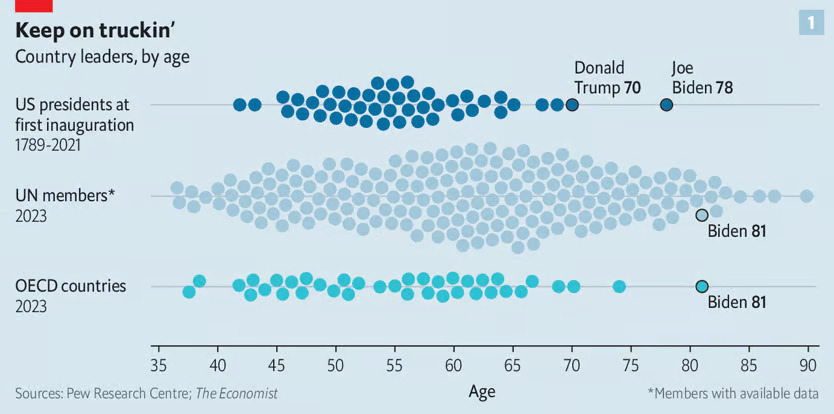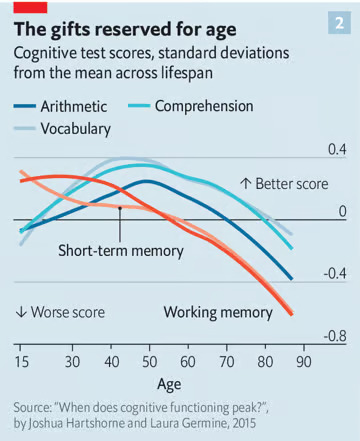They say age brings wisdom, but it also brings physical decline. When the challenges of aging overshadow the benefits of experience, it might be time for even the most ambitious individuals to contemplate a peaceful retirement.
If either Joe Biden or Donald Trump has pondered such retirement, it’s evident they have firmly rejected the idea. Instead, both are positioning themselves as candidates for second terms in one of the most demanding roles on the planet. Mr. Trump, currently 77, will turn 78 during the general election, while Mr. Biden, at 81, would reach 86 at the end of a potential second term.
The prevalent scientific explanation of aging, known as the disposable-soma theory, suggests that natural selection prioritizes youth over age, as it best serves the task of passing genes to the next generation. In both candidates’ cases, this has occurred. Mr. Biden fathered four children and has seven grandchildren; Mr. Trump fathered five and has ten. However, the evolutionary flip side, according to many observers, is becoming apparent in verbal and physical slips, particularly noticeable in Mr. Biden. Some suggest that retirement may indeed be a beckoning option.

image: the economist
In the realm of age, Mr. Biden and Mr. Trump stand as outliers, deviating not only from other American presidents but also from the current leaders of other nations (refer to chart 1). When Mr. Trump assumed the presidency in 2017, he became the oldest person to hold that office, a record surpassed in 2021 by Mr. Biden.
An analysis conducted last year by the Pew Research Centre in Washington, DC (also depicted on chart 1), revealed that among the 187 countries with available data, only eight had leaders older than Mr. Biden. (Paul Biya of Cameroon, at 90, holds the record as the oldest leader.) Notably, among the affluent democracies of the OECD, the trend since 1950 has seen a decrease in the average age of heads of government upon assuming office, dropping from 60.2 to 55.5 in the past fifty years. This prompts the question of the likelihood of either Mr. Biden or Mr. Trump completing their terms.
The matter involves numerous variables, and not all relevant personal data are public. Aging science itself is uncertain, with some studies suggesting that the responsibilities of running a country take a toll. A 2015 study by researchers at Harvard Medical School and Case Western Reserve University School of Medicine, examining head of government elections in 17 wealthy countries back to 1722, concluded that winners lived 4.4 fewer years after their last election compared to runners-up who never held the top position. On the contrary, the elevated social status of presidents can enhance lifespan, as demonstrated by various studies, including the Whitehall studies from 1967 to 1988 by Michael Marmot of University College, London (UCL), focusing on British civil servants.
Possibly, these effects balance out. A 2011 study by Jay Olshansky, a gerontologist at the University of Illinois, estimated the expected mean lifespan for male contemporaries of America’s presidents to be 73.3 years, based on contemporary data. The actual lifespans of presidents who died of natural causes averaged 73.0 years, suggesting either that the job takes no toll (contradicting some studies) or that incumbents would have lived longer than the average. Dr. Olshansky’s explanation favors the latter, emphasizing that presidents typically hail from privileged backgrounds, enjoying associated health advantages.
Beyond mortality concerns, an incumbent might face medical events like debilitating heart attacks or strokes, potentially leading to resignation or the invocation of the 25th Amendment to the U.S. Constitution, which addresses presidential incapacity. Broadly speaking, the risk of stroke or heart attack doubles with each passing decade, a worrisome factor.
Beneath the surface of each candidate’s physical health lie concerns about their mental well-being. As the years pass, two threats to the brain emerge: specific dementias like Alzheimer’s disease and a general slowing of cognitive processes—though recent research indicates potential overlap between the two.
Medical imaging allows for the examination of the brains of those without dementia symptoms for characteristic misshapen protein clumps associated with Alzheimer’s. A 2019 study by Jonathan Schott, a neurologist at UCL, and his colleagues demonstrated that such plaques still appear harmful even in those without a formal Alzheimer’s diagnosis.
Conversely, research from 2022 by a Northwestern University team in Chicago, exploring neurofibrillary tangles, another Alzheimer’s marker, reported that “super-agers” had fewer of these tangles compared to apparent disease-free non-“super-agers,” showcasing a genetic advantage in maintaining healthy minds and bodies.
Irrespective of the cause, cognitive decline is the age-related symptom most widely discussed regarding the candidates, especially in light of apparent “senior moments” displayed by both men. In 2021, for instance, Mr. Biden seemingly forgot the name of Lloyd Austin, his defense secretary, while Mr. Trump has at times confused Xi Jinping, the Chinese president, with Kim Jong Un, the North Korean leader.

image: the economist
Research indicates that mental abilities undergo diverse changes with age, with some faculties declining while others show improvement, at least temporarily. Joshua Hartshorne and Laura Germine, affiliated with Harvard and the Massachusetts General Hospital, respectively, have contributed to the understanding that wisdom tends to increase with age, up to a certain point. People’s arithmetic and comprehension skills, along with their vocabulary, typically improve until around the age of 50, after which they begin to decline .
Conversely, tasks involving short-term memory (recollection immediately after presentation) and working memory (recollection half an hour later) show a downward trend from the age of approximately 20. Some scores drop by as much as half a standard deviation below the population mean by the time an individual reaches 85.
While these findings might raise concerns about elderly candidates, Dr. Olshansky at the University of Illinois dismisses such worries for two main reasons. Firstly, he emphasizes the health-promoting environments provided by most candidates’ privileged backgrounds during their upbringing. Secondly, in the case of Mr. Biden and Mr. Trump, he suggests they may possess sturdier genetic attributes than many of their peers, implying that they could be classified as super-agers.
Despite Mr. Trump’s undeniable privileged upbringing as the son of a multimillionaire businessman and Mr. Biden’s mixed family fortunes with the advantage of attending a private school as a teenager, the super-ager argument presents a more intriguing perspective. Dr. Olshansky and five colleagues, during the previous Biden-Trump contest four years ago, analyzed available data related to the two men.
Both candidates hail from long-lived families, each with an octogenarian and a nonagenarian parent, a positive predictor of longevity. However, Mr. Trump’s brothers died at ages 42 and 71, and his father developed Alzheimer’s—a factor against him in longevity calculations, considering his weight and lack of exercise compared to Mr. Biden.
Despite these factors, Dr. Olshansky concluded from available data, combined with publicly accessible medical records, that both candidates had a higher-than-average probability of surviving the following four years. Mr. Biden was estimated to have a 95% chance, compared to 82% for a typical man of his age; for Mr. Trump, the figures were 90% compared to 86% for his contemporaries. Notably, their calculations gave Mr. Trump, the younger man, a less favorable prognosis.
While not yet providing a comprehensive assessment for the current situation, Dr. Olshansky stated on January 7th, in an article in the Hill, that “Today his [Mr. Biden’s] chances of surviving through a second term in office are close to 75% (about 10% better survival than for an average man his age). Similar, although slightly less favorable survival prospects are present for Trump.”
Regarding the occasional lapses in memory, Dr. Olshansky tends to attribute some to sampling errors resulting from constant scrutiny. For instance, he notes that an incident last June in which Mr. Biden fell off his bicycle was due to catching his foot in a pedal strap rather than losing balance, an accident that could happen to anyone. Dr. Olshansky underscores the more relevant fact that a 76-year-old (as Mr. Biden was at the time) was cycling in the first place.

